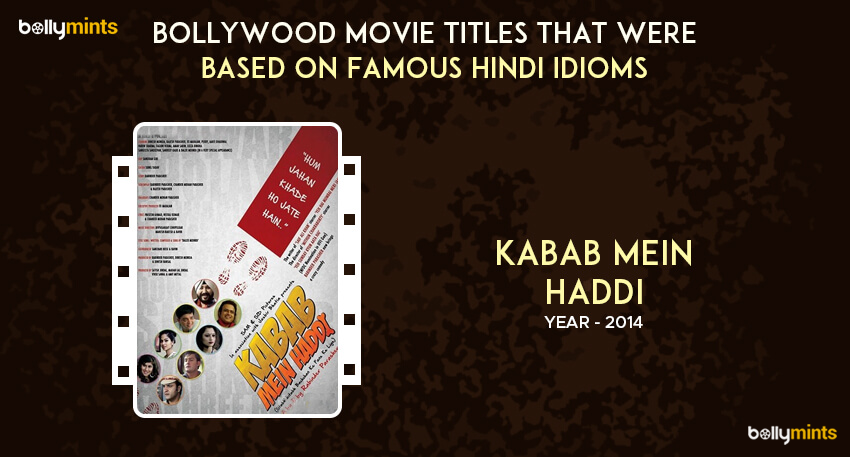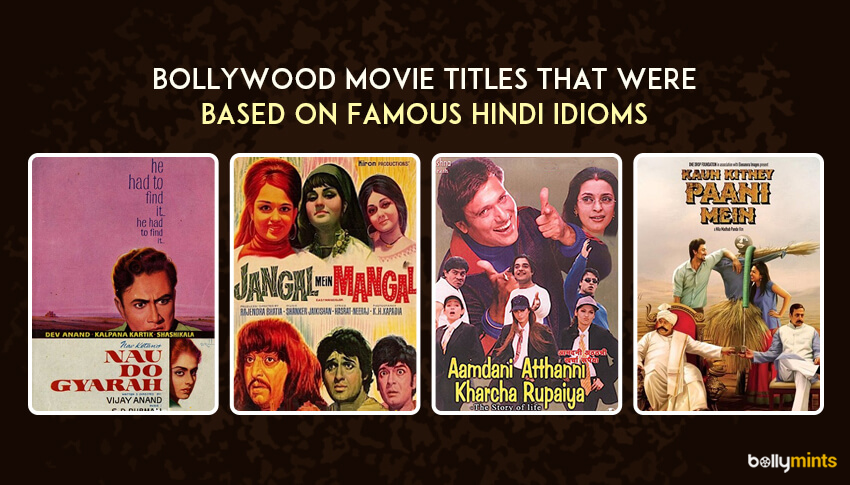Bollywood Movie Titles That Were Based On Famous Hindi Idioms
Posted On: 07 Mar 2022 | Last Updated : 07 Mar 2022 | Views : 4.6k
Every language has its own unique collection of idioms, so does Hindi. Idioms are particularly useful when you want to express yourself in a creative way, rather than using regular expressions. It is fun when you play with rhyming words to convey some genuine ideas. Despite being creative, these phrases help you to support your statement with the general idea. When creativity or innovation comes in the frame, Bollywood could never be too far behind. The title of the film is a very important aspect, and the filmmakers pay a great deal of heed while deciding the name or title of the movie. Thus, once in a while, we even see creative movie titles not just based on the name of the character of the movie, but something clever like using a famous idiom/phrase that conveys the idea or the theme of the movie much better. Here, we present to you the list of some of Bollywood’s popular movie titles based on the famous Hindi idioms and phrases.
1. Nau Do Gyarah (1957)
Meaning: To make a good escape, to slip away quietly, or to disappear before someone notices.
About the Movie: Directed by Vijay Anand, Nau Do Gyarah was a comedy thriller drama that follows the story of Madan Gopal (Dev Anand), a traveller, who is headed to his uncle, Manoharlal’s hometown. He is travelling to meet Manoharlal, who wrote him a letter and is willing to give him his property. However, on reaching the destination, he finds out that his uncle has died under mysterious circumstances.
Why this Idiom as Title?: Manoharlal was willing to give nine (Nau) lakhs worth of property and two (Do) lakhs cash to Madan, which means a total of eleven (Gyarah) lakh rupees to Madan.
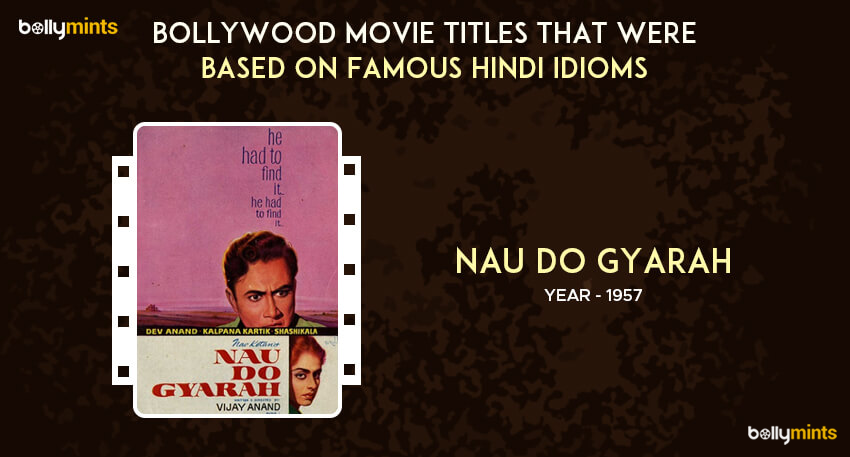
2. Apna Haath Jagannath (1960)
Meaning: To depend on none but oneself to finish the task, or self-help is the best help.
About the Movie: Mohan Segal’s family drama Apna Haath Jagannath follows the story of a hardworking man Madan (Kishore Kumar), who takes up a labouring job against the wishes of his father and other family members. Things get worse when Madan’s father throws him out of his house after things turn sore between the father and son, and Madan is left all by himself.
Why this Idiom as Title?: The idiom goes perfectly with Madan’s situation, as after he is thrown out of his house, he has no one to support him. Madan still doesn’t lose hope and is determined to prove himself by working hard.
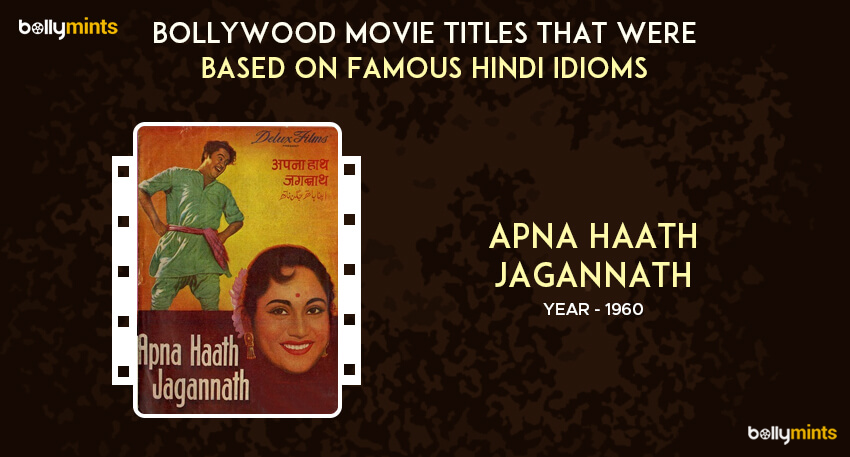
3. Miya Bibi Razi (1960)
Actual Idiom: Jab Miya Biwi Razi Toh Kya Karega Qazi.
Meaning: When two parties are agreeing to something then the third person's opinion isn’t necessary.
About the Movie: Jyoti Swaroop’s 1960 romantic drama Miya Bibi Razi starred Mehmood, Seema Deo, Kamini Kadam and Shreekant Gaurab in the titular roles. The movie follows the story of two couples, who have been torn apart because of the feud between their fathers, which is fuelled by the differences in their financial backgrounds. To be together, the lovers try to bring their fathers together and resolve the rivalry.
Why this Idiom as Title?: As suggested by the idiom, when the two main parties agree to something, the third person has no business to interfere. However, on the contrary, in the movie, despite the lovers being ready to marry, they can’t because of their family feud.
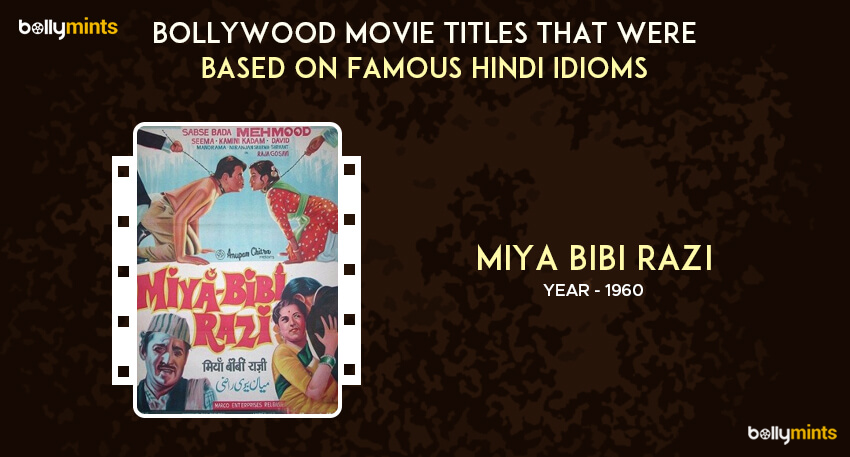
4. Bin Badal Barsaat (1963)
Meaning: Bolt out of the blue, something totally unexpected, or a complete surprise.
About the Movie: The romantic drama Bin Badal Barsaat was directed by Jyoti Swaroop and stars Asha Parekh and Biswajit Chatterjee in the lead roles. The movie revolves around the age-old curse running in a wealthy Thakur family, according to which any woman who marries the man of this family will die a fatal death within a year. Prabhat, a man of the same family falls in love with a girl named Sandhya but informs her of the curse. She considers it false and finds no trouble in marrying him. However, things change when Sandhya sees Prabhat performing an unusual ritual.
Why this Idiom as Title?: Despite learning about the curse, Sandhya scoffed at it and didn’t believe in it. However, Prabhat performing the unusual ritual hits Sandhya like a bolt, as she never expected it and was left in complete shock at the sight of it.
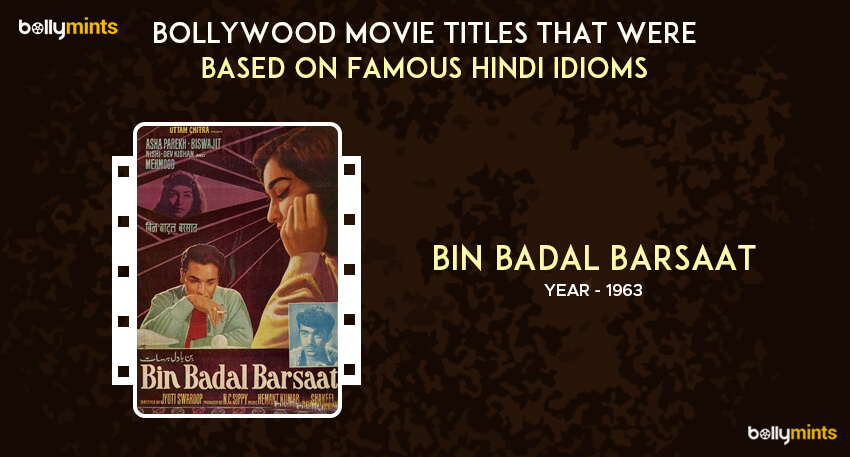
5. Idd Ka Chand (1964)
Meaning: To be seen once in a blue moon, to make a rare appearance or visits that become few and far between.
About the Movie: Directed by Nanubhai Vakil, Idd Ka Chand follows the story of a girl named Anjuman Ara who is a believer in truth and sincerity. Aamri, a king, believes that he is God. However, Anjuman Ara flashes him with the truth and proves that there is only one God. Meanwhile, Jahan Ara, daughter of Aamri, is bewitched by Shaitaan and creates problems for Anjuman, but Anjuman Ara triumphs and helps Jahan Ara to reform. Together, the two embrace Imaan.
Why this Idiom as Title?: Though the idiom isn’t used in its actual sense, it still fits the storyline. 'Idd Ka Chand', in its literal sense, marks the end of the Holy month of Muslims and is celebrated with much joy and happiness. The movie also depicts the celebrations on the day of Idd, and talks about the importance of Idd and the holy month of Ramadan.
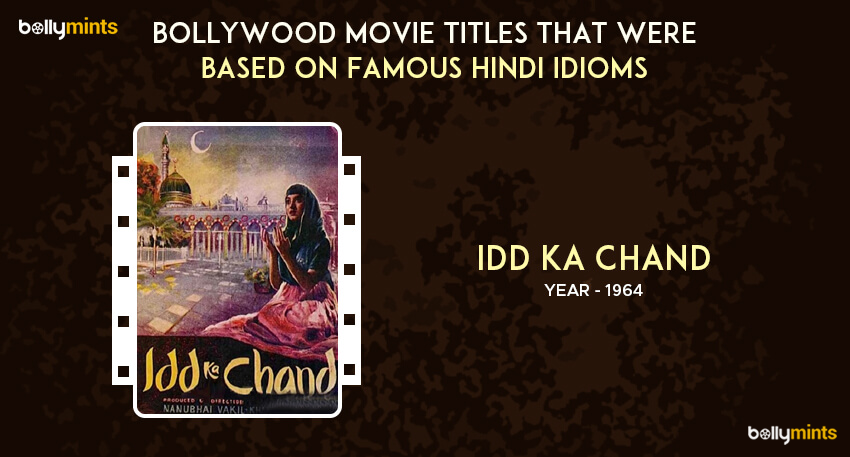
6. Jangal Mein Mangal (1972)
Meaning: A paradise in the wilderness, or to bring a party in the most deserted or desolated place.
About the Movie: Rajendra Bhatia’s romantic thriller drama, Jangal Mein Mangal is a multi-starrer film starring Kiran Kumar, Sonia Sahni and Pran in titular roles. The movie revolves around a group of college students, who go on a field trip near a forest. However, things take a turn when the students get killed one by one by a mysterious creature, who brutally kills anyone coming his way.
Why this Idiom as Title?: The forest was deserted and desolated until the group of students visited it, and it is then they learn about the homicidal mysterious creature residing in the forest. Not exactly the party, but the horror of this creature residing in the wilderness spreads and creates panic.
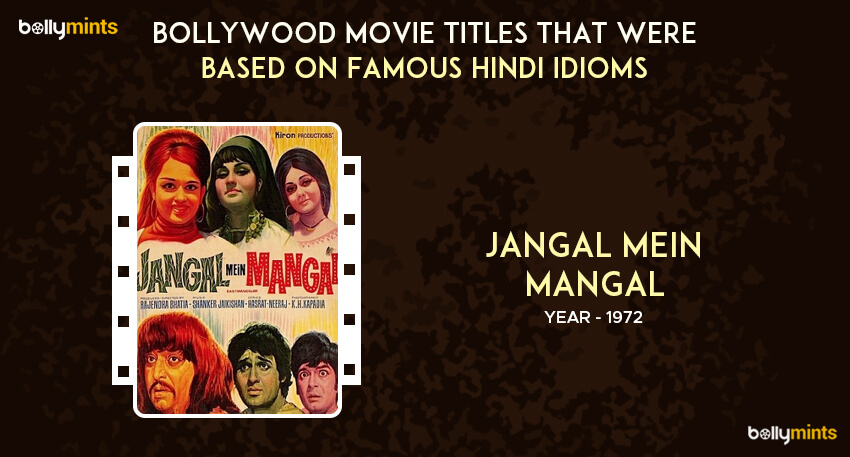
7. Jaise Ko Taisa (1973)
Meaning: Tit for tat, or to do something unpleasant to someone because that person did the same to you.
About the Movie: Directed by Murugan Kumaran, Jaise Ko Taisa starred Jeetendra in a double role. The movie follows the story of identical twins, who are separated at birth and raised by different families. One of them is raised in tough and poor surroundings and grows up as a strong man. While, the other one is brought up by a wealthy family, and his family abuse, drug, and torment him to control him and have an easy life, thus he grows up as a weak and submissive person. Things take a turn when the boys are switched, and taken by one another’s family.
Why this Idiom as Title?: This idiom as the title of the movie makes sense, as the strong brother, who has been raised in tough surroundings, faces the dominating people and treats them in the same way they treated his brother all his life. While the other brother is finally united with his mother, and finally gets the love he was always deprived of.
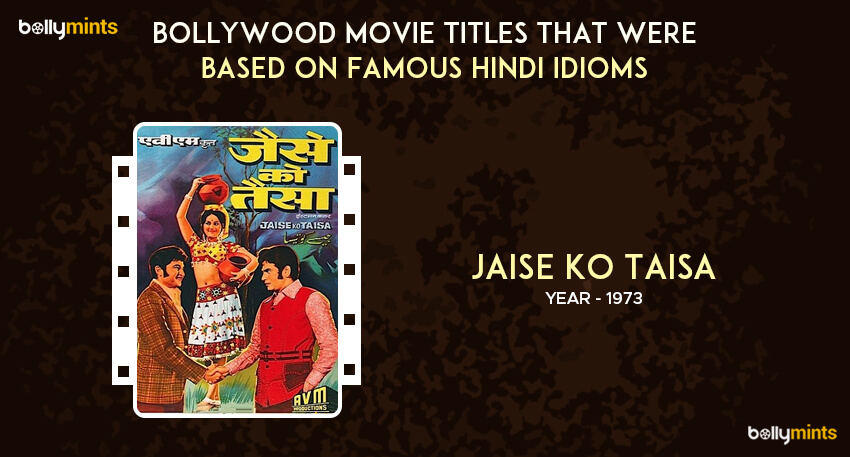
8. Nehle Pe Dehlaa (1976 / 2007)
Meaning: To go one better, or to outdo an adversary.
About the Movie: Directed by Raj Khosla, the action drama Nehle Peh Dehlaa follows the story of two brothers, Ram (Sunil Dutt) and Rahim (Vinod Khanna), who are separated at a very young age by a smuggler (Prem Nath), who also kills their father. Growing up, the two become thieves and when they meet each other, they decide to become partners, still unaware of their relationship. However, eventually, the two learn the truth about their past and decide to take revenge on the smuggler. The title Nehlle Pe Dehlla was also used by Ajay Chandhok in the 2007 film starring Sanjay Dutt, Saif Ali Khan, and Bipasha Basu.
Why this Idiom as Title?: The two brothers, despite being separated at a young age have no memory of one another and are reunited by destiny to fulfill the motive of their lives, which is to avenge their father’s death. Despite the hardships and troubles, they faced all their lives, the two grow up strong and are ready to outgrow their enemy.
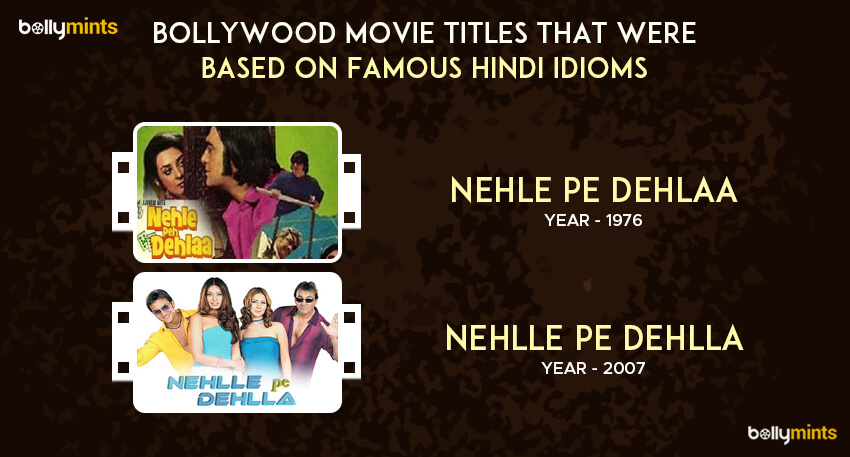
9. Aankh Ka Tara (1977)
Meaning: Apple of one’s eye, to be very dear to someone, or something that one cherishes above all.
About the Movie: The tragic family drama Aankh Ka Tara follows the story of Parvati (Nirupa Roy), who had always longed for a child, and her dream comes true when she gives birth to a boy and names him Makhan. However, things take a tragic turn when Parvati is separated from her son. As a result, Makhan gets involved in an accident and loses his eyesight. Years later, he changes his name to Mohan (Sachin Pilgaonkar), and becomes a renowned radio personality. A girl named Geeta (Bindiya Goswami) falls in love with Mohan, but his disability becomes their problem as Geeta’s father doesn’t approve of the match.
Why this Idiom as Title?: A mother losing her beloved son (who was the apple of her eye) and a girl not being able to be with the love of her life because he is blind, the reason why the filmmakers must have settled with this idiom as the title of the movie is coherent.
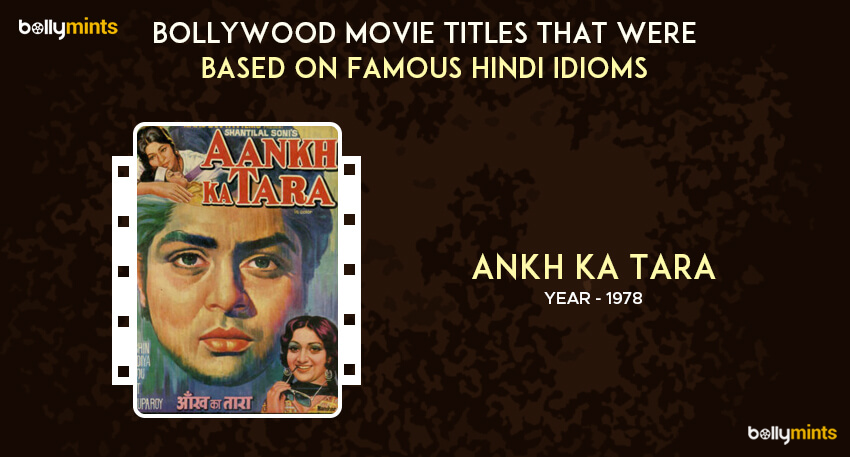
10. Eent Ka Jawab Patthar (1982)
Meaning: To take revenge, or to give back a stronger blow when someone attacks or does something wrong to you.
About the Movie: Mithu Singh’s romantic drama Eent Ka Jawab Patthar follows the story of Madhav (Surendra Pal) and Lakshmi (Neeta Mehta), who fall in love and wish to get married. However, the match is not approved by Lakshmi’s brother, Diwan, who frames Madhav to separate the lovers forever. That’s when Madhav plans to give it back to Diwan in the same coin.
Why this Idiom as Title?: The title of the movie makes sense in the second half of the film when Madhav decides to fight back and give a stronger blow to defeat Diwan and reunite with Lakshmi.
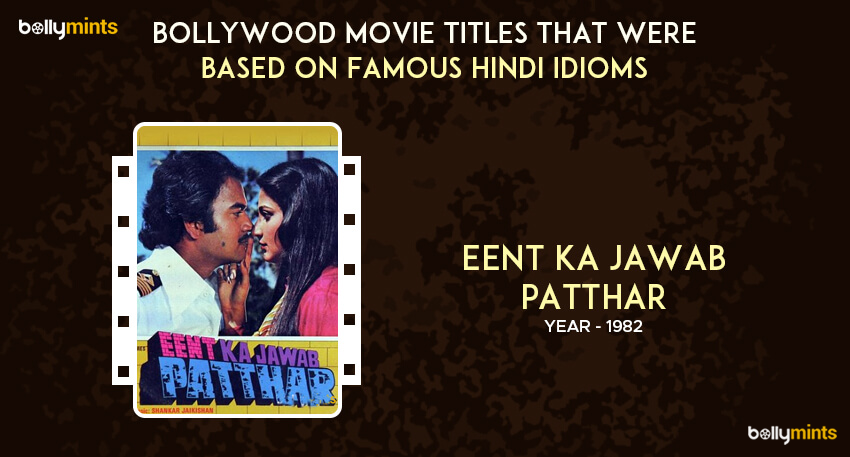
11. Jaisi Karni Waisi Bharni (1989)
Meaning: One has made (one’s) bed and one must lie on it, or the actions or deeds of the person repay him in the same kind.
About the Movie: Directed by Vimal Kumar, the 1989 family drama Jaisi Karni Waisi Bharni follows the story of an old man, Gangaram Verma (Kader Khan), a government servant, who leads his life with honesty. Things take a turn when Gangaram’s son, Vijay (Shakti Kapoor), throws his parents out of his house. However, years later, Vijay meets the same fate, when his son Ravi (Govinda) throws him out of his house to teach him a lesson.
Why this Idiom as Title?: Vijay, being blinded by greed, never considers himself wrong, until he is made to repay for his actions, when his son treats him in the same way, as he treated his father. Thus, the use of this idiom as the title seems plausible.
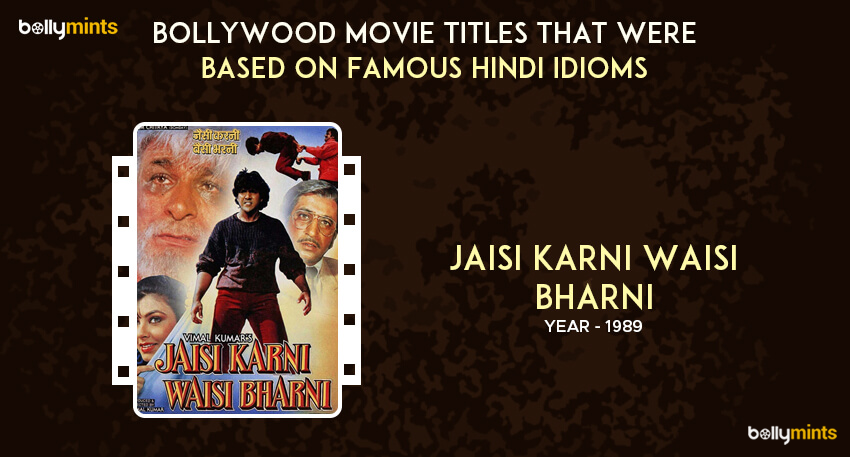
12. Allah Meherban To Gadha Pahelwan (1997)
Meaning: If luck favours you, you can accomplish anything.
About the Movie: Directed by Ravindra Arora, the comedy-drama Allah Meherban To Gadha Pahelwan stars Zahid Ali, Shakti Kapoor, Kader Khan, Kulbhushan Kharbanda, Malasri, Asha Sharma, and Mahesh Raaj. This multi-starrer movie follows the story of a bunch of characters who are leading a mediocre life but dream of having an extravagant life.
Why this Idiom as Title?: Just like many movies on the list, this movie has the idiom as its title because it perfectly fits the storyline. Everything great has a small beginning and when God is graceful, all your dreams come true.
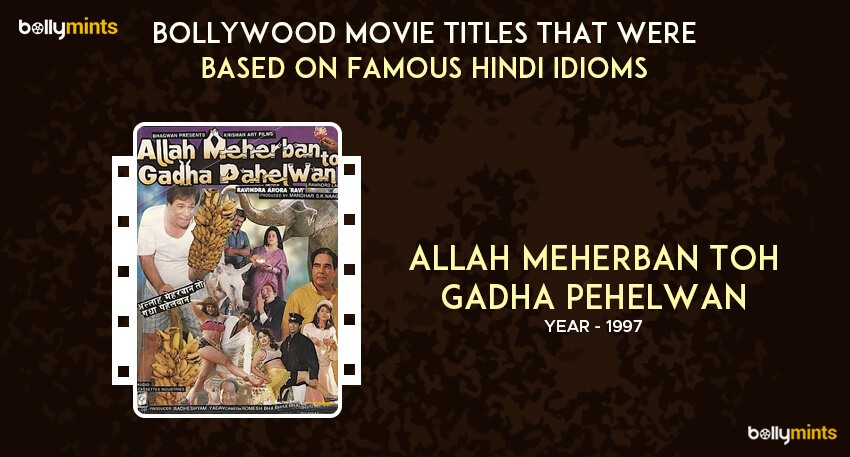
13. Iski Topi Uske Sarr (1998)
Meaning: Take something from one person to pay another, or to discharge one debt only to incur another.
About the Movie: Raju Mavani’s comedy-drama Iski Topi Uske Sarr follows the story of two orphans Jai (Sharad Kapoor) and Raj (Mukul Dev). An elderly lady, Gayatri (Aruna Irani) shelters the two along with a girl named Milli (Divya Dutta), as they have nowhere to go. Jai and Raj become thieves and commit petty crimes to support themselves. However, trouble ensues when they fool a dreaded gangster.
Why this Idiom as Title?: The idiom fits the storyline, as all Raj and Jai do is fool others. They take away money from one person to discharge their debt with another lender and plan to do the same with the gangster. However, it is to find out if they will escape the unwanted trouble that they invited by fooling this dangerous man?
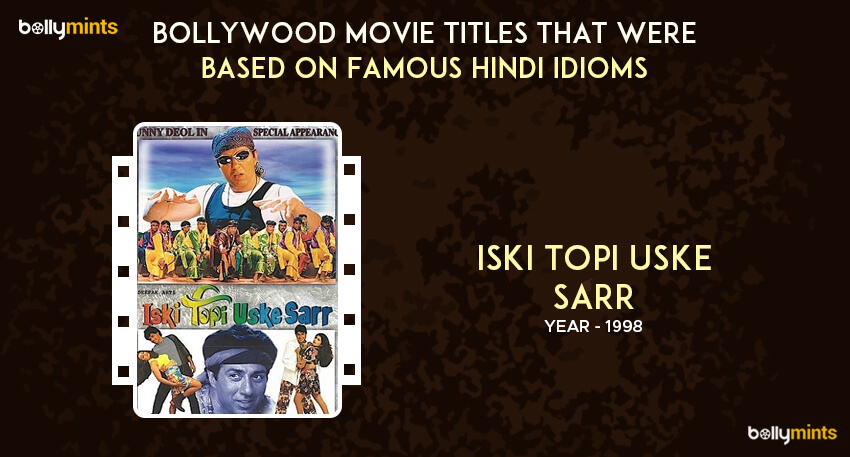
14. Aamdani Atthanni Kharcha Rupaiya (2001)
Meaning: To incur expenses that are much greater than wages or penny-wise pound foolish.
About the Movie: K. Raghavendra Rao directed comedy-drama, Aamdani Atthani Kharcha Rupaiya is a multi-starrer movie starring Govinda, Juhi Chawla, Chandrachur Singh, Isha Koppikar, Johnny Lever, etc. It follows the story of three housewives living in the same neighbourhood, who are dissatisfied with the income of their respective husbands. On the contrary, their husbands lead a carefree lifestyle and have no sense of responsibility. Frustrated with the attitude of their spouses, the three women decide to step up and start working to have enough funds to incur the family expenses but face the opposition of their husbands who go to great lengths to stop their wives from working.
Why this Idiom as Title?: This Bollywood movie title inspired by the famous Hindi idiom perfectly goes with the movie’s storyline, as the husbands lead a carefree lifestyle and incur expenses that are much higher than their income.
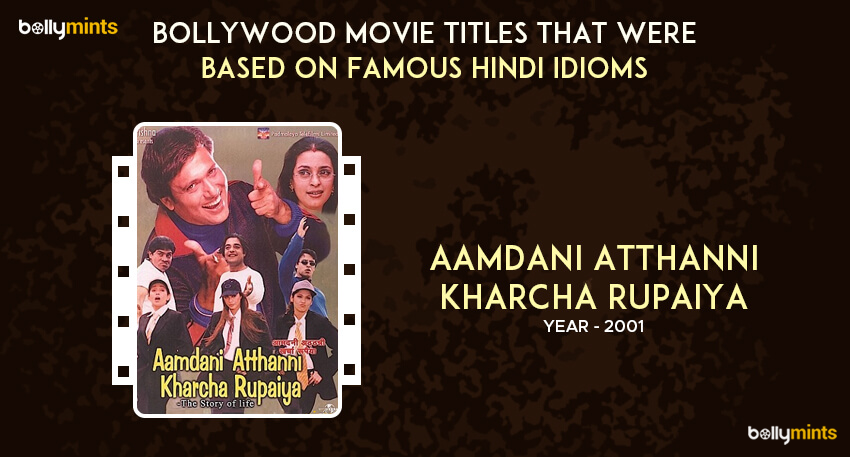
15. Ek Aur Ek Gyarah (1981 / 2003)
Meaning: The idiom describes the efficiency of the alignment of a group – when united we stand if divided we fall, or the efficiency of the group multiplies with its expansion.
About the Movie: Two Bollywood movies released by the same title one was Ashok Roy’s Ek Aur Ekk Gyaraah (1981) starring Shashi Kapoor, Vinod Khanna, and Neetu Singh while the other Ek Aur Ek Gyarah was David Dhawan’s 2003 comedy-drama, starring Govinda, Sanjay Dutt, Amrita Arora, Nandini Singh, and Jackie Shroff, revolves around two brothers – Tara (Sanjay Dutt) and Sitara (Govinda). They are notorious, small-town conmen, who are always making trouble wherever they go. Under disguise, they take shelter in the house of Major Ram Singh (Jackie Shroff). However, when a gangster kidnaps their mother, the two are forced to deceive Major Ram Singh.
Why this Idiom as Title?: The movie surely depicts the actual meaning of the idiom – the power of unity. Whenever the two brothers are together, they make everything possible.
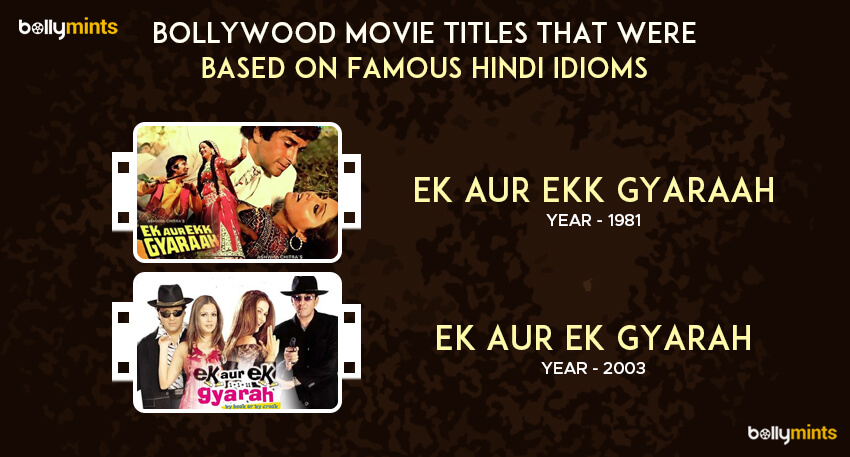
16. Na Ghar Ke Na Ghaat Ke (2010)
Actual Idiom: Dhobi Ka Kutta Na Ghar Ka Na Ghat Ka
Meaning: Someone who has no permanent abode to reside, or one who is rejected by both sides.
About the Movie: Directed by Rahul Aggarwal, the comedy-drama Na Ghar Ke Na Ghaat Ke stars himself in the lead role. It follows the story of a simple man named Devkinandan Tripathi (Rahul Aggarwal), who lives in a small village with his family. To try his luck and earn a huge sum of money, Devkinandan travels to Mumbai with his wife. However, things don’t go as planned, as city life is totally different from village life. Thus, Devkinandan has to face a lot of problems while he tries to adjust to his new life in the big city.
Why this Idiom as Title?: When Devkinandan reaches Mumbai and leaves his village behind, he finally faces reality. He realizes that now he belongs neither to his village, as he left everything behind, nor to this city, as it is a long walk before he gets used to this city.
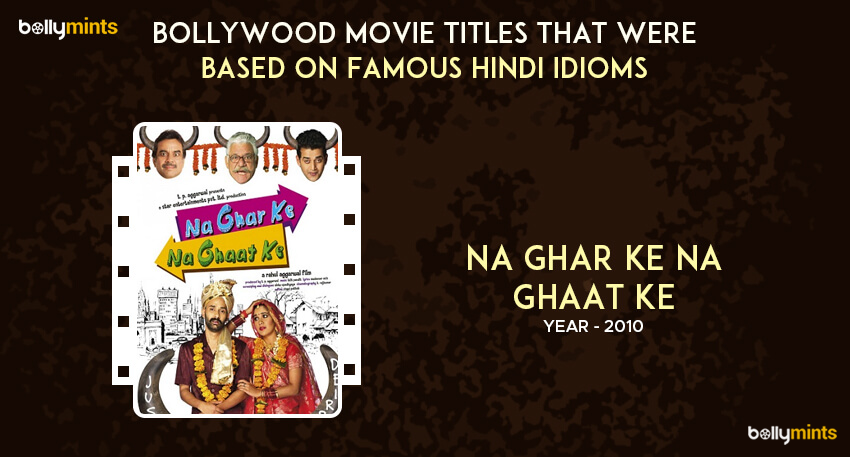
17. Daal Mein Kuch Kaala Hai (2012)
Meaning: To smell a rat, something fishy or suspicious, or to suspect foul play.
About the Movie: Anand Balraj’s comedy-drama Daal Mein Kuch Kaala Hai follows the story of a budding actress (Veena Malik), who dreams of becoming a top Bollywood actress. When she comes across a rich man, she decides to team up with her boyfriend and con the man.
Why this Idiom as Title?: The idiom Daal Mein Kuch Kaala Hai perfectly fits the storyline, as the girl with the plans to con the rich man always ends up in the situation, which makes the people surrounding her always smell something fishy or suspicious.
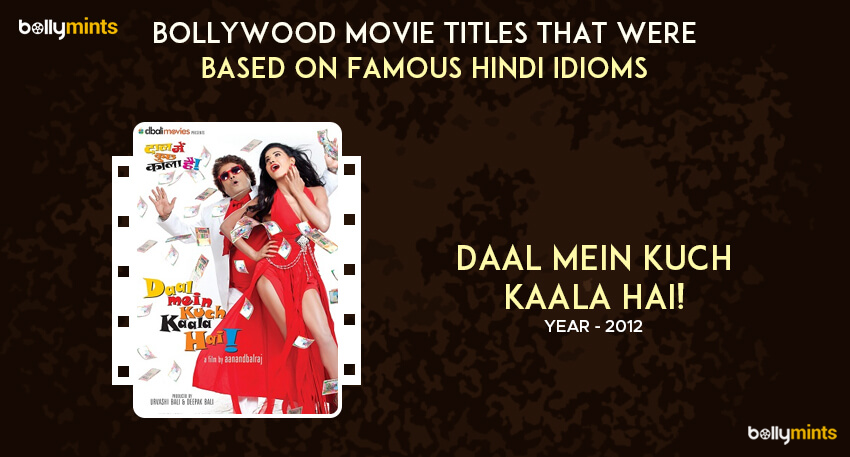
18. Lakeer Ka Fakeer (2013)
Meaning: To be conservative, or to give more importance to the old/traditional methods.
About the Movie: Zubair Khan’s crime thriller drama, Lakeer Ka Fakeer starring Vinod Acharya, Vicky Ahuja, Saaikat Bagbaan and Ajaz Khan in title roles, revolves around three friends. The three are the small-time crooks. Their life is filled with troubles and the reason behind most of their problems is the place where they reside. They come from the most notorious area of Mumbai, where the activities of organized criminal gangs take place.
Why this Idiom as Title?: Even though the literal meaning of the idiom doesn’t go with the movie, the main character of the movie is named Fakeer (Ajaz Khan), who is one of the three friends, and the movie mostly follows his story. Thus, to make the title of the film catchy, filmmakers got creative and used a Hindi idiom with the main character’s name in it.
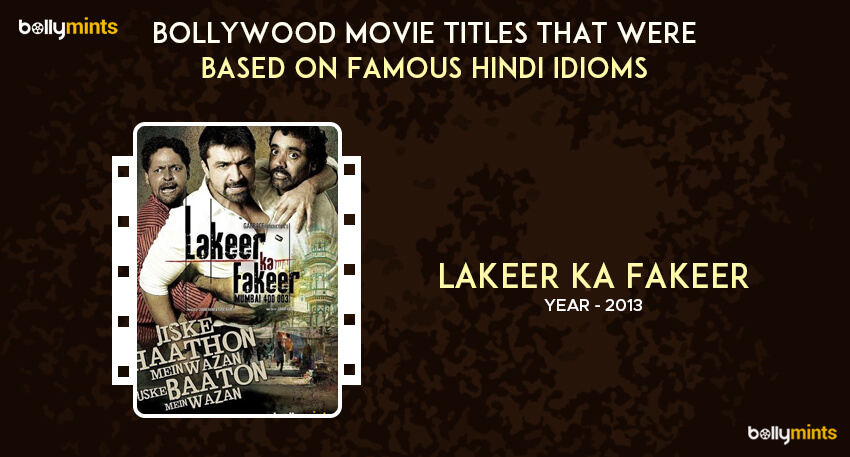
19. Kaun Kitney Paani Mein (2015)
Meaning: The idiom is used as an interrogative poser in a challenging tone to enquire about one’s potential/capability/ability.
About the Movie: The satirical comedy-drama Kaun Kitney Paani Mein follows the story of two fictitious villages: Upri which has all the upper caste people and Bairi that has people from a lower caste. Due to their differences in caste, the residents of these villages have always opposed each other. However, when the two villages are hit by the severe shortage of water, the two villages finally agree to reconcile and together solve the problem.
Why this Idiom as Title?: Despite their pride, at times of adversity, the residents of the two villages have to agree to reconcile because they need each other’s resources and skills to get through this difficult time. Even though the residents of each village are capable in their own ways, none is perfect. The idiom also has the word Paani (Water), which perfectly goes with the theme of the movie, as it talks about water scarcity.
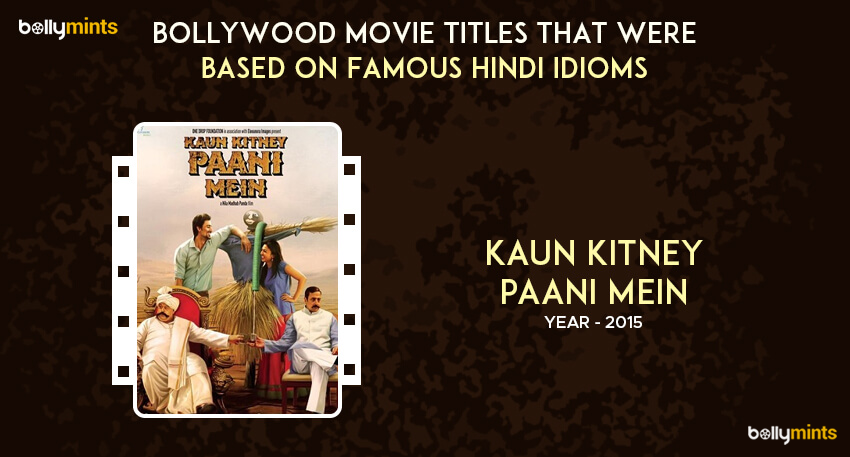
20. Saanch Ko Aanch Nahin (1979)
Meaning: Nothing can harm the truth or a truthful person fears no examination.
About the Movie: Directed by Satyen Bose, Saanch Ko Aanch Nahin is the story about Manoharlal (Om Shiv Puri) a businessman who appoints his friend Satyaprakash (Arvind Deshpande) as a sole arbitrator in a business matter concerning one of his agents. To make his case stronger Manoharlal fixes his daughter’s marriage with Satyaprakash’s son but after the verdict goes against the former, the alliance is broken. But as they say, truth triumphs over all as Manoharlal finally realizes his fault and seeks forgiveness from Satyaprakash.
Why this idiom as Title?: Despite Manoharlal trying his best to cover up the truth finally had to give in as they say one who stands by the truth nothing harms him/her.
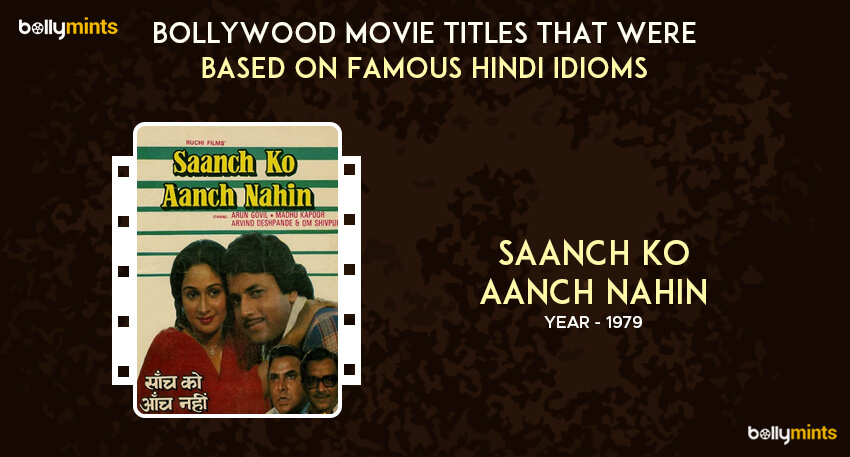
21. Kabab Mein Haddi (2014)
Meaning: An unnecessary or unwanted person’s presence during one’s enjoyment.
About the Movie: Kabab Mein Haddi was one of those lesser-known movies that had an unknown star cast and was about a London-based NRI guy who wants to marry an Indian girl, but time and again gets caught in a web of income tax raids, cops and other unnecessary disturbances.
Why this idiom as Title?: The unnecessary disturbances that are caused to the protagonist in the film while romancing the female is like having a ‘Haddi’ (bone) while eating a ‘Kabab’ (piece of boneless chicken) and destroys the enjoyment.
